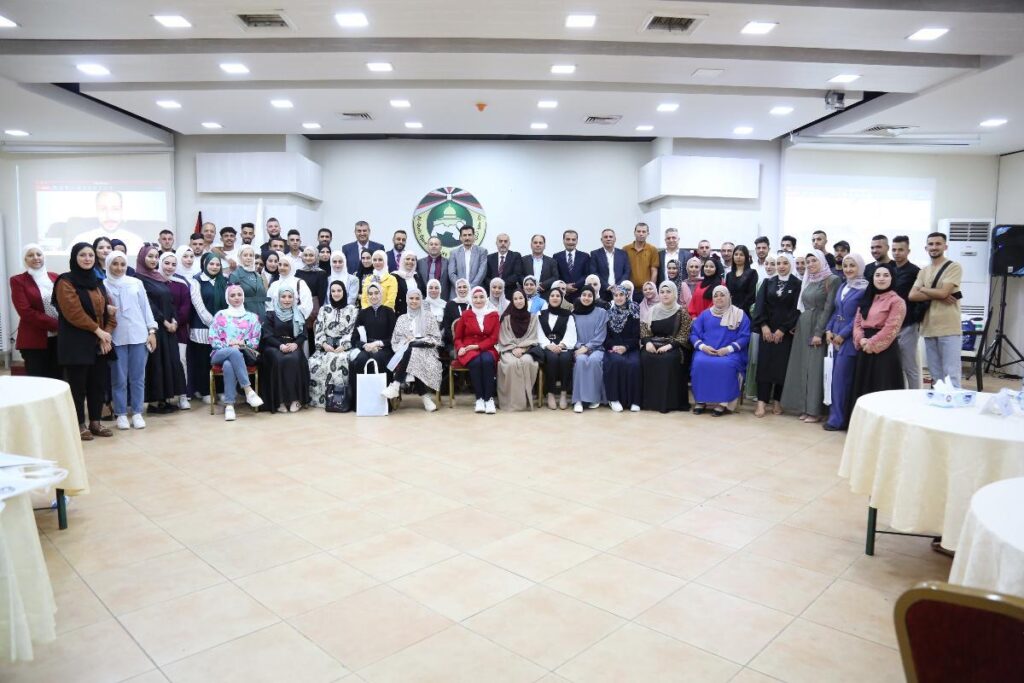
QOU held a closing ceremony of “Reinforcing Access to Cross Border Employment at Palestinian Higher Education Institutions-Reach” project, funded by Erasmus+. The project involved nine universities (four European and five Palestinian) with the Islamic University of Gaza serving as the lead institution. REACH project aimed to enhance cross-border employment opportunities for graduates of Palestinian universities, while strengthening the capabilities of Palestinian higher education institutions.
The President of Al-Quds Open University (QOU), Prof. Samir Najdi, warmly welcomed the attendees and expressed his satisfaction with the outcomes of the REACH project. He stated, “QOU is committed to continuously advancing higher education in Palestine and serving our community. We strive to provide high-quality education to all, regardless of their location, and help them realize their dreams and professional aspirations.”
Prof. Najdi emphasized the importance of access to employment opportunities, saying, “We recognize the critical role that access to work and decent employment plays in the success of our graduates. This is why we are dedicated to implementing various projects, including REACH, which seeks to achieve a strategic goal: equipping graduates with the specialized skills necessary for success. This project opens real opportunities for Palestinian university graduates, enabling them to enter the global labor market through freelance platforms, achieve. professional success, and build a bridge between academic education and remote work. Ultimately, our goal is to empower graduates with the competencies needed to thrive in their professional futures.”
Dr. Abdel Karim Daraghmeh, Director of the Erasmus+ Office in Palestine, highlighted that this project introduced innovative concepts related to freelance employment platforms, helping Palestinian youth access remote work opportunities.
Dr. Mahmoud Hawamdeh, Director of the Centre for Continuing Education and Community Service, emphasized that the project aimed to promote cross-border remote work through collaboration between Palestinian and international universities. It facilitated cultural and cognitive exchanges to train academic staff capable of imparting essential knowledge to graduates, equipping them with the professional and specialized skills needed to succeed in the global labor market through self-employment platforms. One key achievement of the project was the establishment of a tele-work center, fully equipped to provide qualification and training for university graduates. Over 160 graduates received training in various fields, including soft skills, translation and language skills, and information technology. Dr. Hawamdeh added, “The center has enabled companies and employers to find talented, highly skilled professionals. As a result, many graduates from various disciplines have secured jobs with local and regional companies.”
Ms. Amani Maady, General Manager of the Palestinian Information Technology Association (PITA), praised both the project and the tele-work center, stressing that its significance lies in laying the foundation for students to acquire high-level, market-relevant skills.
The event featured two key sessions: the first, titled “Incubators and Entrepreneurial Companies: The Role of Incubators in Supporting Remote Employment,” and the second, “Academic Affairs at Al-Quds Open University: Challenges and Opportunities in Achieving Integration Between Academic Education and Remote Employment; Building Bridges to Develop Competencies and Professional Independence.”
Among the key recommendations from the sessions were the signing of a Memorandum of Understanding (MoU) to implement activities promoting remote freelancing, fostering an entrepreneurial mindset among students by incorporating self-employment into university curricula, supporting academic research on remote self-employment, and enhancing students’ personal marketing skills to better position them in the global workforce.


